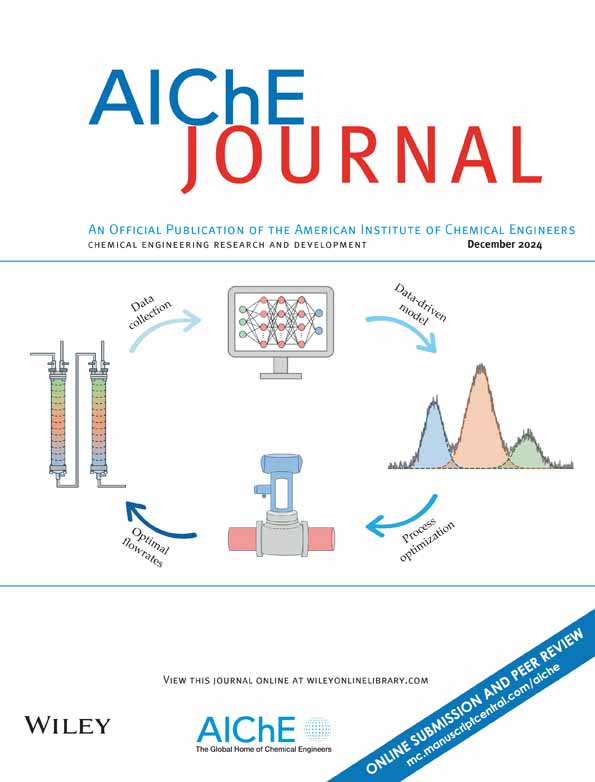在石墨烯上将金属有机多面体转化为Pd单原子以实现炔的高效选择性半氢化
IF 3.5
3区 工程技术
Q2 ENGINEERING, CHEMICAL
引用次数: 0
摘要
烷基选择性加氢制烯烃是化学工业的关键。含pd材料已被证明是有效的催化剂,但平衡活性和选择性之间的权衡仍然是一个重大挑战。本文首次报道了利用金属有机多面体(MOPs)转化制备单原子钯的方法。由Pd盐和含n配体构建的MOP (M6L4)可以通过π-电子耦合与石墨烯载体相互作用,使MOP分子具有良好的分散性。在随后的热处理中,Pd被原位形成的n掺杂石墨烯锚定,产生单个Pd原子(表示为Pd1/G)。所制得的Pd1/G催化剂在温和条件下(298 K, 1 bar H2)对苯乙炔进行半加氢反应时,表现出良好的活性(100%转化率)和苯乙烯选择性(94%)。这种性能远远优于Pd/G纳米粒子催化剂和商用Lindlar催化剂,是目前报道的苯乙炔半加氢催化剂中性能最好的催化剂之一。本文章由计算机程序翻译,如有差异,请以英文原文为准。
Converting metal–organic polyhedra to Pd single atoms on graphene for efficient selective semi-hydrogenation of alkynes
Selective hydrogenation of alkynes to alkenes is pivotal in the chemical industry. Pd-containing materials have been proven to be effective catalysts, while balancing the activity-selectivity trade-off remains a significant challenge. Here we report the fabrication of Pd single atoms from the conversion of metal–organic polyhedra (MOPs) for the first time. The MOP (M6L4), constructed from Pd salt and N-containing ligand, can interact with the graphene support via π-electron coupling, leading to well dispersion of MOP molecules. In subsequent thermal treatment, Pd is anchored by N-doped graphene formed in situ, producing single Pd atoms (denoted as Pd1/G). The obtained Pd1/G catalyst exhibits excellent activity (100% conversion) and styrene selectivity (94%) in the semi-hydrogenation of phenylacetylene under mild conditions (298 K, 1 bar H2). Such performance is much superior to the counterpart catalyst Pd/G with Pd nanoparticles and the commercial Lindlar catalyst and is among the best of the reported catalysts for phenylacetylene semi-hydrogenation.
求助全文
通过发布文献求助,成功后即可免费获取论文全文。
去求助
来源期刊

AIChE Journal
工程技术-工程:化工
CiteScore
7.10
自引率
10.80%
发文量
411
审稿时长
3.6 months
期刊介绍:
The AIChE Journal is the premier research monthly in chemical engineering and related fields. This peer-reviewed and broad-based journal reports on the most important and latest technological advances in core areas of chemical engineering as well as in other relevant engineering disciplines. To keep abreast with the progressive outlook of the profession, the Journal has been expanding the scope of its editorial contents to include such fast developing areas as biotechnology, electrochemical engineering, and environmental engineering.
The AIChE Journal is indeed the global communications vehicle for the world-renowned researchers to exchange top-notch research findings with one another. Subscribing to the AIChE Journal is like having immediate access to nine topical journals in the field.
Articles are categorized according to the following topical areas:
Biomolecular Engineering, Bioengineering, Biochemicals, Biofuels, and Food
Inorganic Materials: Synthesis and Processing
Particle Technology and Fluidization
Process Systems Engineering
Reaction Engineering, Kinetics and Catalysis
Separations: Materials, Devices and Processes
Soft Materials: Synthesis, Processing and Products
Thermodynamics and Molecular-Scale Phenomena
Transport Phenomena and Fluid Mechanics.
 求助内容:
求助内容: 应助结果提醒方式:
应助结果提醒方式:


